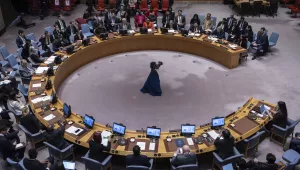BEIRUT -- As has been the case for the past six decades or so, the usually turbulent politics of Lebanon mirror almost perfectly the many strands of political, ideological, commercial and criminal activities that define public life in the Arab region. So it is again with the elections that will take place on June 7 -- comprising a series of positive and negative attributes that give these elections much greater significance than would normally be the case. I would suggest five dimensions by which the election results could shed light on pertinent national, regional and global issues.
1. This is a rare election in the Arab world because the results are not known ahead of time -- and, when they are known, they definitely will not show one party winning 97.8 percent of the vote, as happens in so many other Arab countries where most elections are an insulting joke. This is especially true because there are something like 17-19 seats whose results are unpredictable (out of 128 total) -- and they will determine the overall results. The resolution of ideological competition through a truly contested free vote should be celebrated - along with the alphabet and tabbouleh salad - as one of Lebanon's most meaningful contributions to Arab civilization. This is the last little corner of Arabism where people valiantly hang on to the idea that democratic pluralism is at once appropriate, desirable, and functional.
2. Ideological contests in Lebanon often are proxy battles for wider antagonisms in the Middle East and globally. The two main camps -- roughly the Hariri-led group that is allied with the United States and conservative Arabs, and the Hizbullah-and-Michael Aoun-led groups that are allied with Syria-Iran -- reflect the two dominant ideological confrontations that now define the Middle East. The election results will clarify the relative strengths of these two camps, probably revealing nearly equally matched strengths that will reinforce the need for negotiated coexistence and power-sharing.
3. On the national front, the elections are often contested on the basis of what could be called, in very rough shorthand, pro- or anti-Syrian platforms. The results could produce a new configuration of power-sharing that modifies the current system of the government majority and the opposition both wielding veto power on major decisions, perhaps a small centrist block linked to the president, and certainly a clarification of relations between Lebanon and Syria. This is of monumental importance for most Lebanese, and of marginal interest to everyone else in the world -- but it deserves watching because the local developments touch on, and reflect, the wider trends that make Lebanon such a powerful microcosm of the Middle East as a whole.
4. The elections may be an important step in clarifying whether Lebanon and the entire region move toward more secular, non-sectarian and meritocratic governance systems, or sink deeper into the current regional trend towards religion, ethnicity, and sect playing a greater role in life, power, and identity. The Lebanese people have repeatedly expressed their desire for a more non-sectarian governance system -- as agreed in the Taif accord that ended the civil war in 1990 -- but to date they seem incapable of making the transition to that new world.
5.The fifth issue that might be clarified by the election results and the political deal-making that will follow is whether Lebanon -- like most of the other Arab countries -- will opt for a strong central state that is also efficient and equitable in serving its citizens, or instead will remain with the current model of a weak central state that is dominated by special interests, ethnic groups, religious organizations, and assorted armed groups. Groups that, most of whom, are directly and openly supported, funded and armed by foreign governments.
These five issues strike me as critical to monitor as the election results come in and a new government is formed. The outcome of the voting will be significant far beyond Lebanon, because the country today mirrors the impact of every single major issue and trend in the Middle East, including: the Arab-Israeli conflict; Iranian, Syrian, American and Saudi influences; cultural liberalism and democratization; Islamism; UN intervention (peacekeepers, sanctions and monitoring resolutions, and tribunals); terrorism, militia culture, youth emigration, and several others.
Also, the Lebanon election is best seen in a wider context of six important elections that will have been or will be taking place this year starting last November, in six societies critical for the Middle East: the United States, Israel, Turkey, Lebanon, Iran and -- probably soon -- Palestine. Every other election in the region is not to be taken seriously, unfortunately. These elections will tell us much about our assorted political cultures, ideological leanings, national identities and conceptions of statehood. How refreshing it is to follow a handful of elections that will help define our societies with more clarity and legitimacy than we have experienced from the criminality, police states, street fighting, foreign invasions and resistance that have dominated the Middle East in recent decades.
Rami G. Khouri is Editor-at-large of The Daily Star, and Director of the Issam Fares Institute for Public Policy and International Affairs at the American University of Beirut, in Beirut, Lebanon.
Khouri, Rami. “Five Markers to Watch in the Lebanon Election.” Agence Global, May 11, 2009




